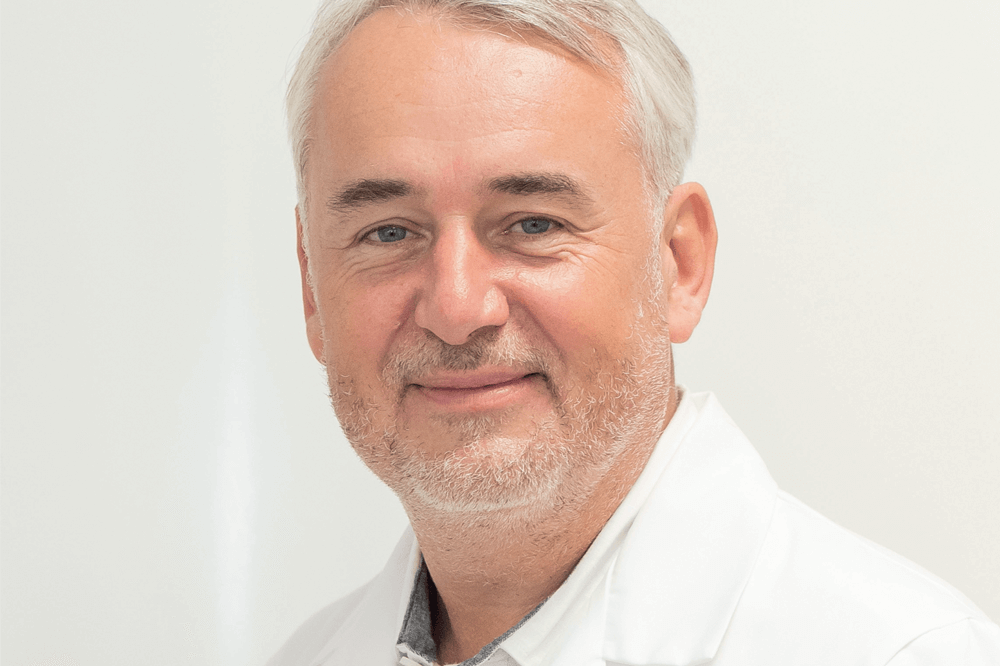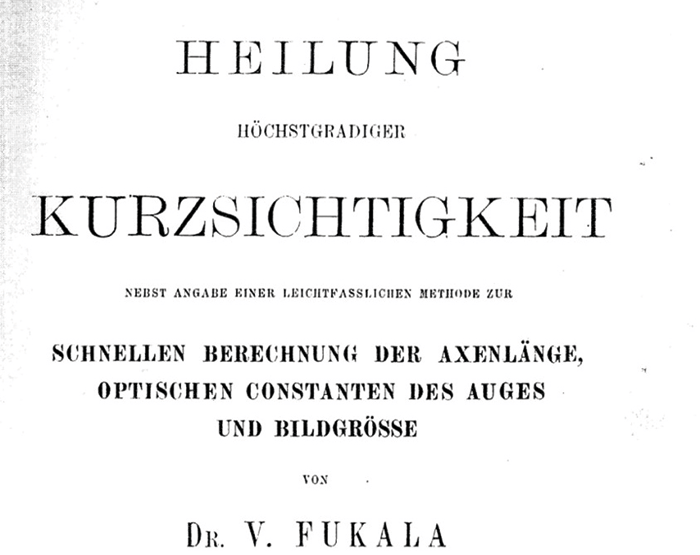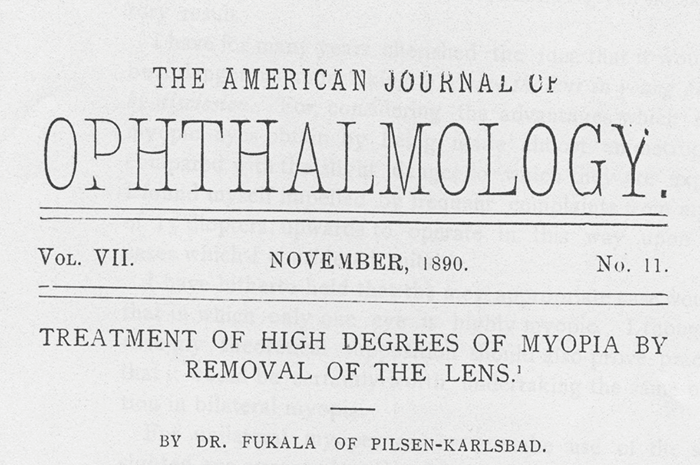
I remember first learning at an international meeting that Fukala was a Japanese ophthalmologist, then later being told that he was Austrian. After finally discovering that he was, in fact, Polish, I – also a Polish ophthalmologist – was embarrassed to learn that there was no information about him available in English. This is in part due to the fact that, because most of his life was spent within the Austro-Hungary Empire (while Poland was occupied by Russia, Germany, and Austro-Hungary), a large majority of his works were written in German. Spotting a gap to be bridged, I reached out to Dieter Schmidt, Professor of Ophthalmology at Freiburg University in Germany, to ask for his help in analyzing Fukala’s work in detail and publishing the summary in English.
Who was Fukala?
Vincenz Fukala (Wincenty Fukała) was born in 1847 to a Polish family in Żółkiew in Polish Galicia (now Zhovkva, Ukraine). He studied medicine in Vienna, Austria, specializing in ophthalmology under Carl Ferdinand von Arlt. He also studied trachoma in Egypt in 1872. Between 1889 and 1894, he worked as an ophthalmologist in Pilsen (Pilsen-Karlsbad) and Karlove Vary in the Czech Republic. His research on scrofulous eye disease led him to the US in 1891 and again in 1892.
Fukala also pioneered highly successful techniques for the treatment of ectropion in blepharitis, of trachoma, and of shallow sockets following enucleation. In glaucoma, he recommended early iridectomy of the fellow eye following blindness in the first eye. He was also an expert on the history of ancient European texts and Arabic ophthalmology.

What was his major achievement?
Fukala was a pioneer of the systematic extraction of the clear crystalline lens in young patients with high myopia. This procedure was known as the Fukala operation and was the earliest refractive surgery performed in ophthalmology. He demonstrated increased visual acuity within his patient group, which enabled them to return to work. As a result of this, other ophthalmologists gradually began to carry out surgery in high myopes worldwide. He persisted in operating despite vigorous opposition from several authorities but, through sheer determination, he convinced skeptics of the efficacy of his lens dissection surgical method. He performed the first lens discission in 1887 and, by 1894, had successfully treated 44 patients.
Fukala’s inclusion criteria for surgical eligibility were very strict. Patients had to have very poor vision that rendered them unable to work, with myopia of -13 D or higher. He only operated on children with progressive myopia and on young adults, with an upper age limit of approximately 40 years. In patients with myopia of about -18 D, Fukala recommended bilateral surgery to establish binocular vision. Fukala’s procedure consisted of discission of the clear lens with subsequent needling and extraction of the swollen lens material. Postoperatively, most of his patients had good visual acuity, displaying an at least fourfold improvement in their vision, and were able to return to work.
Regarding the procedure, Von Hippel, a famous German ophthalmologist, wrote, ‘‘Fukala’s operation was initially regarded with suspicion, yet within a short time more and more ophthalmologists came out in favor of this surgical procedure… perhaps those of you who are skeptical or reject it could abandon your theoretical doubts to enable patients (who for so long had to do without both) to work and enjoy life.’’ Additionally, Casey A. Wood, a prominent American ophthalmologist, translated Fukala’s publication from Graefes Archive of Ophthalmology for the American Journal of Ophthalmology (see Figure 2).
Fukala died in 1911. The late complication of retinal detachment, which would not be understood for years, eventually led surgeons to abandon his procedure – until recently, when improvements in both lenticular and retinal surgery techniques that led to better prognosis resulted in its resurgence.

Acknowledgement
I would like to thank Dieter Schmidt, Professor of Ophthalmology at Freiburg University in Germany, for his collaboration on Wincenty Fukała’s ophthalmology contributions.
References
- D Schmidt, A Grzybowski, “Vincenz Fukala (1847-1911) and the early history of clear-lens operations in high myopia,” Saudi J Ophthalmol, 27, 41 (2013). PMID: 23964186.
- D Schmidt, A Grzybowski, “Vincenz Fukala (1847-1911): versatile surgeon and early historian of ophthalmology,” Surv Ophthalmol, 56, 550 (2011). PMID: 21762942.
- D Schmidt, A Grzybowski, “Vincenz Fukala (1847-1911) and the early history of clear-lens surgery in high myopia,” J Refract Surg, 27, 636 (2011). PMID: 21899242.
